Moussaka is a Greek classic, and here I’ll show you how to make it in the most delicious way possible!
Moussaka is a labour of love, but once you get in the swing of things, it truly couldn’t be easier to make. There are also a fair few different ways to make Moussaka, but today I’ll show you a tasty and authentic way!
Reader, Bea says: ‘Reminds me of home just like my grandma makes !! I love this recipe thank you for capturing the true essence of Greek cuisine ★★★★★’
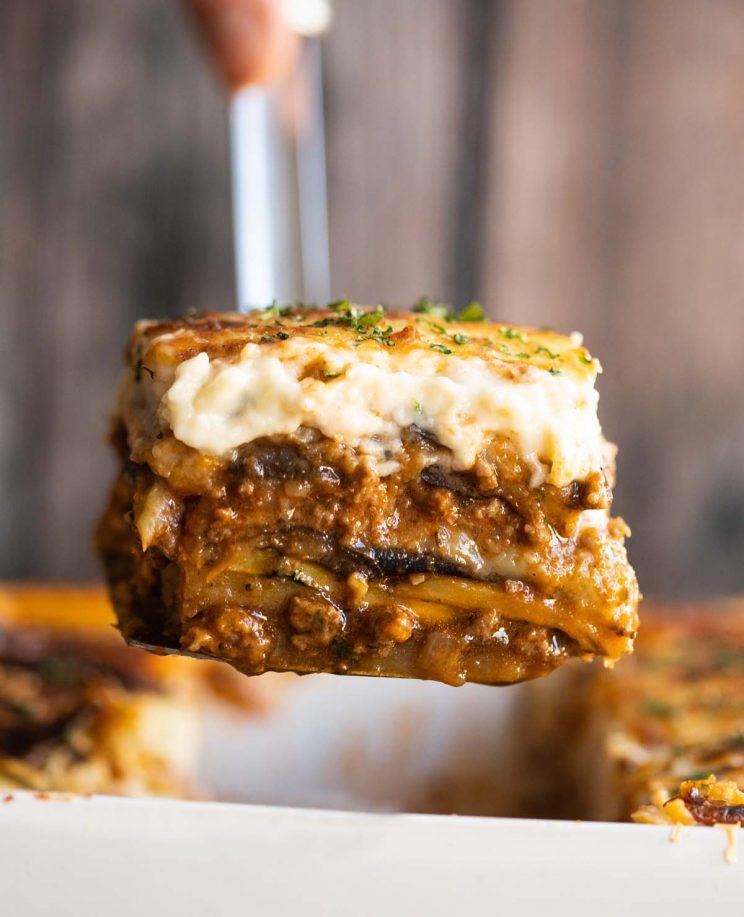
Meat Sauce for Moussaka
Beef vs Lamb
There’s a lot of dispute over what the traditional meat to use in Moussaka is. Most commonly, you’d see lamb or beef being used, but I’ve even read that pork or veal have traditional roots! I’ve personally tried this recipe using beef and lamb, and have settled on beef. In my opinion, it takes on the flavour profile of a Moussaka better, but you can use lamb if you want.
Thick Consistency
The meat sauce for a Moussaka is somewhat similar to a classic ragu/bolognese. One of the main differences is the consistency. Moussaka is known for having distinctive layers, and ensuring your meat sauce has reduced down properly will help create those layers.
Cinnamon
Another distinctive part of a Moussaka’s meat sauce is the use of cinnamon. It’s quite subtle, but it really gives that classic Moussaka flavour. You can use a cinnamon stick, or use ground cinnamon as I’ve done here.
Process shots: fry onion and garlic (photo 1), fry beef (photo 2), add tomato paste (photo 3), fry then add red wine (photo 4), pour in stock and passata then add thyme, parsley, bay leaves, cinnamon and seasoning (photo 5), simmer until thick consistency (photo 6).
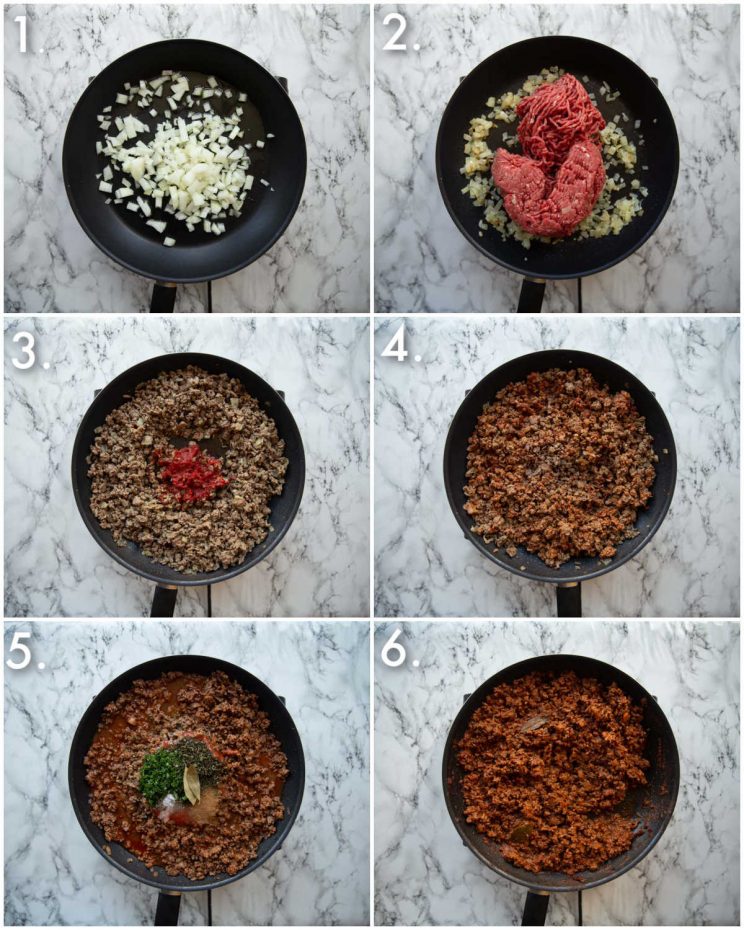
Vegetables in Moussaka
Eggplant/Aubergine
Eggplant in Moussaka is essential. To prepare it, you’ll need to slice then sprinkle with salt and leave to rest. This will not only draw out unwanted moisture but will also remove the bitter taste from the eggplant.
Potato
You could probably get away with just layering with eggplant and still call it a Moussaka, but potato is very widely used. And of course, me being me and this blog being this blog, I highly recommend adding potato. After you’ve sliced the potatoes, I recommend patting them dry to remove unwanted moisture.
Zucchini/Courgette
Not as widely used, but still an authentic addition. Same as above, just pat the slices dry to remove moisture.
You could pat the veg dry with tea towels, but I like to stack them between sheets of paper towel. That way, you can soak them all at once and just leave them until needed.
Recipe Tip #1
Removing the moisture from the vegetables is important whether you bake or fry them. If there’s too much moisture before you fry the veg, it won’t crisp up as well and the oil will spit. If there’s too much before you bake, it will steam and come out too soft.
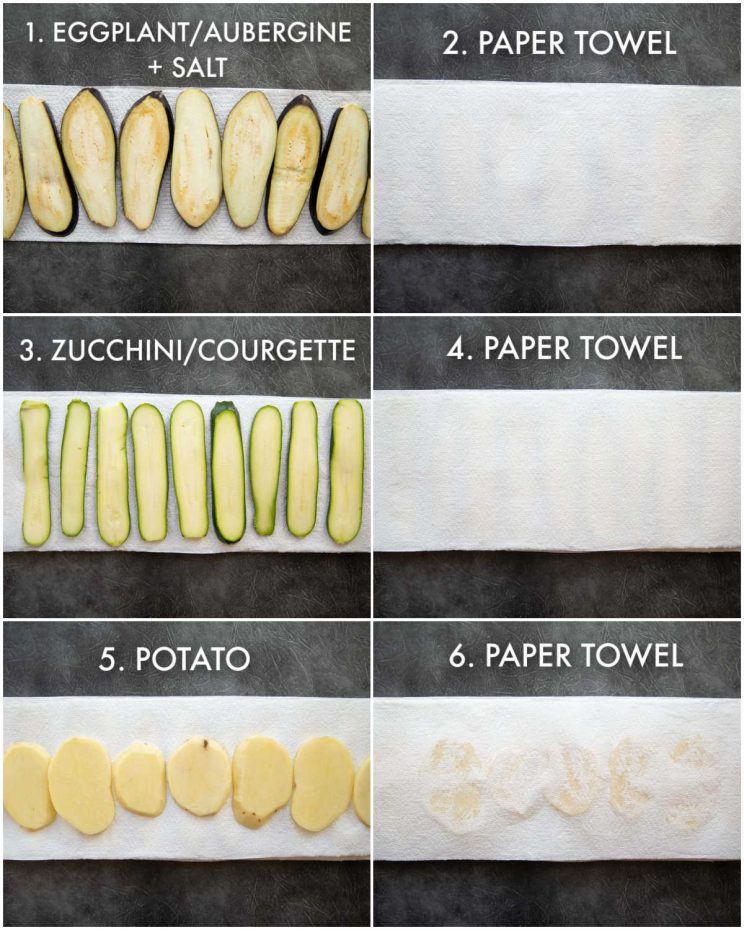
Baking vs Frying
Traditionally, you’d fry the veg, but as times have moved on, so has the cooking method. As such, nowadays it’s just as common to bake the veg. Me? You know I’m not shy of oil around here.
I fry the veg mainly because I’ve always got some leftover pot of oil that needs recycling. That and you do get more of a deeper golden ‘crust’, which offers slightly more flavour.
The obvious downside is the absorption of oil, namely in the eggplant (which is like a sponge!). As such, just make sure you thoroughly pat it all dry with paper towels before you stack the Moussaka. But again, you can definitely bake the veg if you’d prefer.
Recipe Tip #2
Because you’re not frying at a super high temerature, you can use olive oil (which adds more flavour to the veg). Alternatively, for a more neutral flavour, just use veg oil.
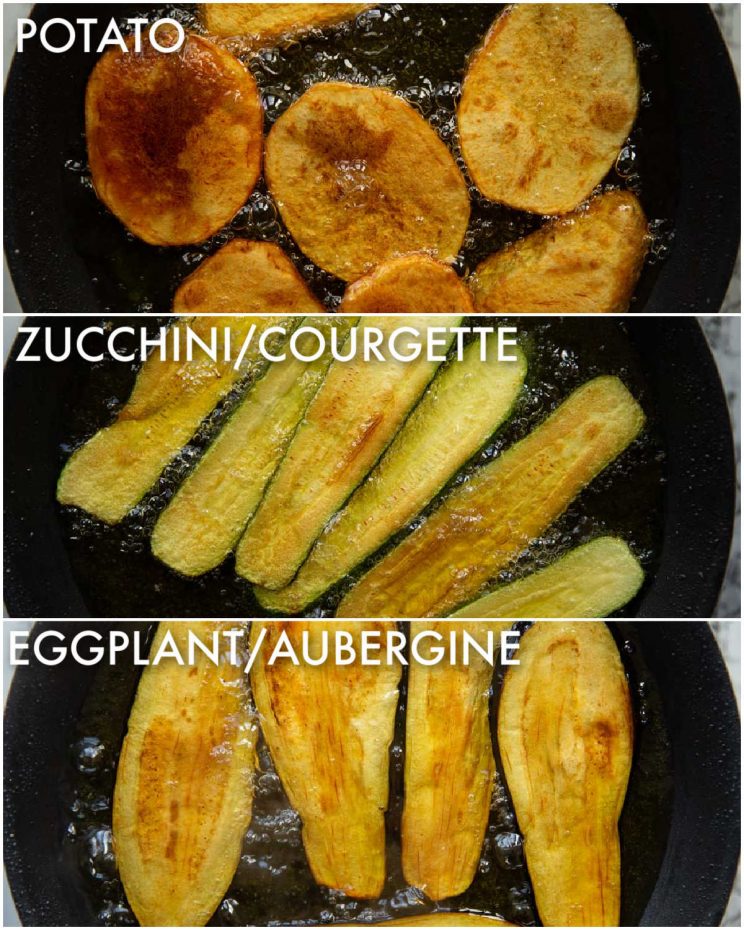
Béchamel Sauce for Moussaka
Meat Sauce layer – check
Veg layer – check
The third and final main layer is the béchamel sauce. Again, this is similar to a classic béchamel you’d use in an Italian lasagne, just with a few differences:
- Consistency – Just like the meat sauce, this béchamel is MUCH thicker than the classic. Again, just to ensure it creates a defiant layer that doesn’t seep into the meat sauce.
- Egg Yolk – These help thicken the sauce, but also add a gentle, rich flavour.
- Seasoning – nutmeg and white pepper are a must! The béchamel sauce makes up quite a thick layer, so it’s important that it’s properly seasoned.
What Cheese to use?
Traditionally you’d use Kefalotyri, but realistically, most hard cheeses work well. Here I use Pecorino, but Parmesan works nicely.
Process shots: melt butter (photo 1), stir in flour (photo 2), whisk in milk (photo 3), add seasoning (photo 4), add cheese (photo 5), stir in egg yolks (photo 6).
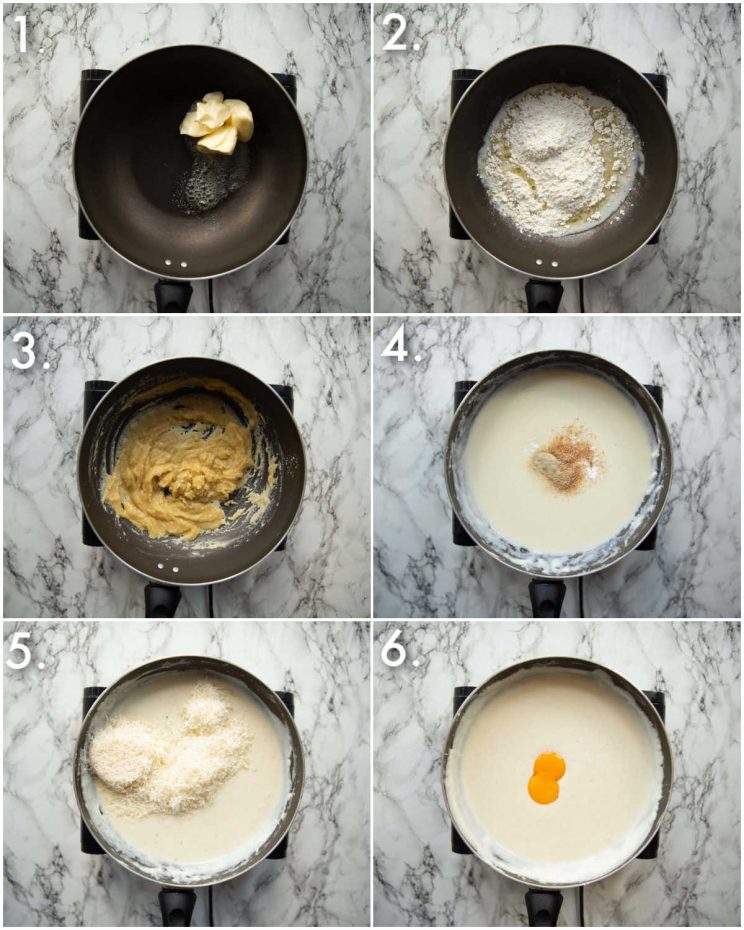
Moussaka Layers
You can stack a Moussaka in various different ways, but you really want to ensure the potatoes are at the bottom, just to create a sturdy base. Then you finish with a nice thick layer of the béchamel. This also ends up going beautifully golden and crispy as it bakes. Here’s how I stack mine:
How to layer a Moussaka
- Potatoes – Sprinkled with cheese, parsley, salt & pepper.
- Zucchini/Courgette – Stacked in the opposite direction to the potatoes. Sprinkled with cheese, parsley, salt & pepper.
- Eggplant/Aubergine – Only use half, sprinkled with salt & pepper.
- Meat Sauce – Ensure this is nice and level/flat.
- Eggplant/Aubergine – Second half stacked in opposite direction to the first layer, seasoned with salt & pepper.
- Béchamel Sauce – Topped with more cheese.
Recipe Tip #3
Overlap the veg as needed, to create a nice, compact moussaka. This will ensure it keeps its shape when you serve, as opposed to spilling over the plate.
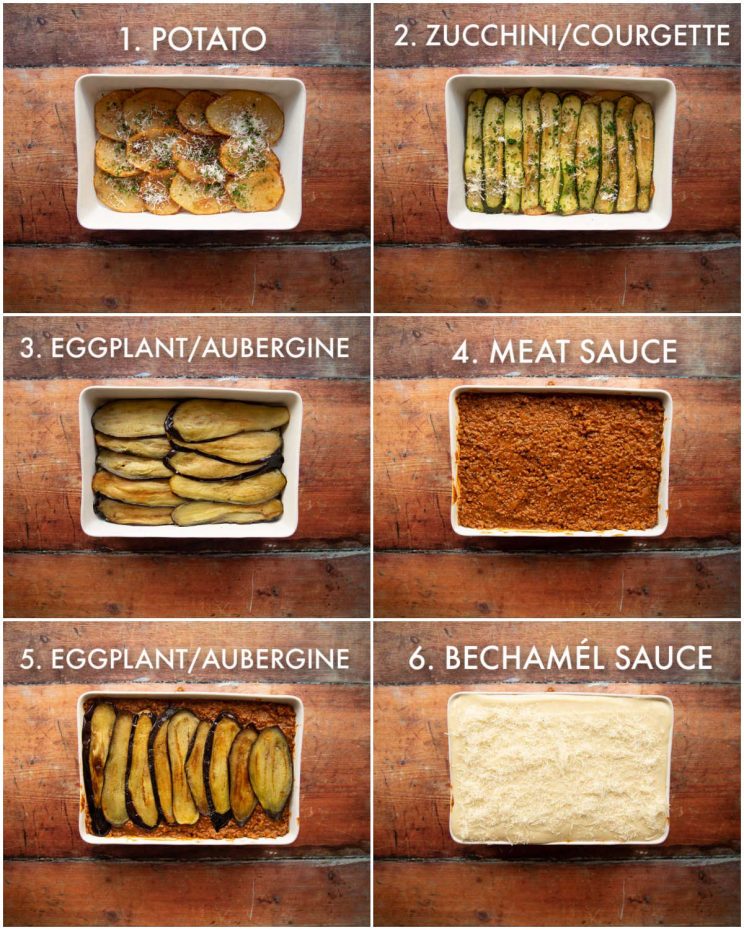
Moussaka FAQ
The main thing is to ensure both the meat sauce and bechamel are nice and thick before you stack the moussaka. Resting the moussaka once it’s fresh out of the oven will help it keep its shape too.
If you’ve fried the veg, it’s really important to use paper towels to soak as much excess oil as possible before you stack the moussaka. It’s also important to use lean beef for the meat sauce, otherwise there will be too much excess fat.
I love adding a glug of wine to the meat sauce for a gorgeous depth of flavour. However, you can sub more beef stock if you’d prefer.
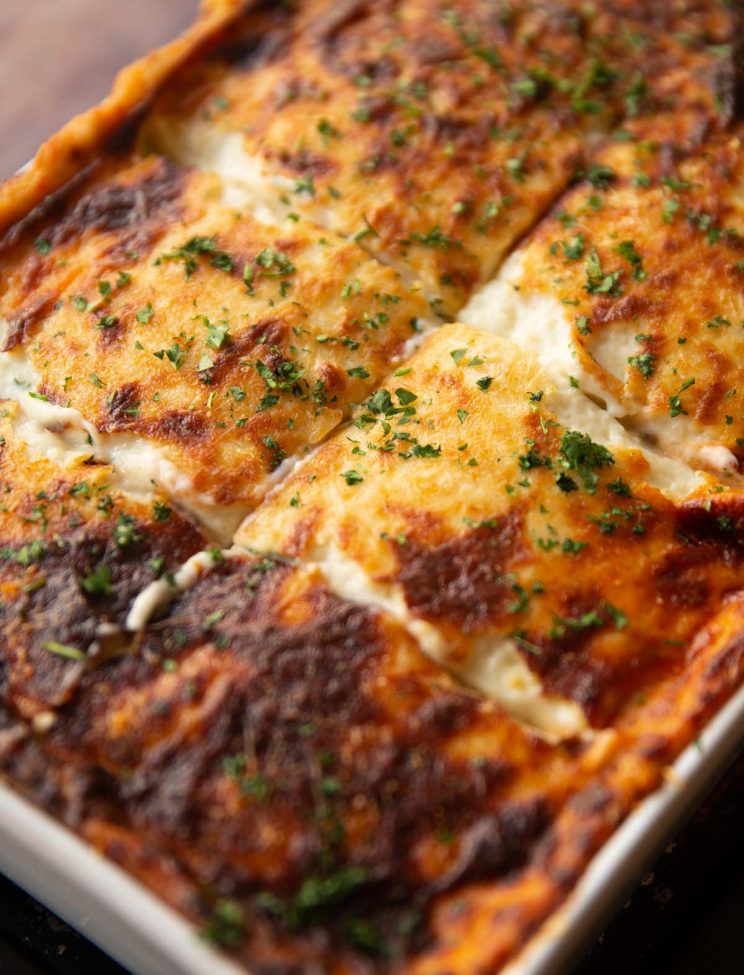
How to serve Moussaka
Again, just to reiterate, it’s important to let the moussaka sit before you serve (it’ll stay hot longer than you think). From there, I like to garnish with a good pinch of fresh parsley and carefully slice it into portions.
These days, I actually serve Moussaka at dinner parties, just because it’s such an epic dish. However, it’s perfect to batch and use throughout the week too.
When it comes to what to serve with Moussaka, here are some of my favourites:
- Side salad and crusty bread (or Garlic Bread). Simple and a lighter option.
- Roasted potatoes or boiled baby potatoes if you’re feeling extra carby.
- Go all out and serve with Greek Fries or Greek Roast Potatoes.
- Roasted Broccolini or Garlic Green Beans for some veggie options.
- Plonk a big bowl of Greek Orzo Pasta Salad in the centre of the table.
Alrighty, let’s tuck into the full recipe for this Moussaka shall we?!
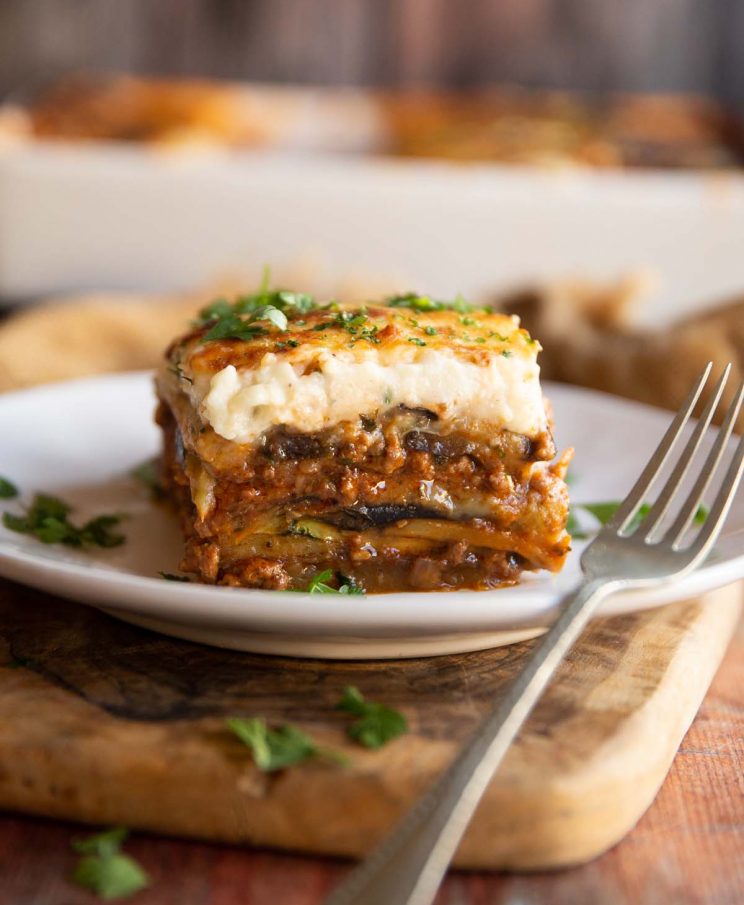
How to make Moussaka (Full Recipe & Video)
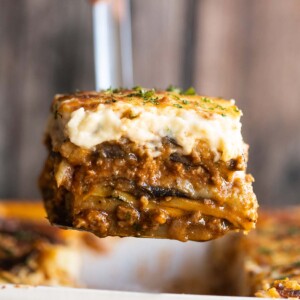
Outrageously Delicious Greek Moussaka
Equipment
- Sharp Knife & Chopping Board
- Large Pot or Pan & Wooden Spoon (for meat sauce)
- Good Quality Kitchen Roll/Papers Towel (lots of it – for soaking veg)
- Large Pan & Tongs (suitable for shallow frying veg)
- Kitchen Thermometer (for frying)
- Medium/Large Pot & Whisk (for bechamel sauce)
- Jug (for milk)
- Fine Cheese Grater (for parmesan)
- 8" x 12" Baking Dish (or similar size – for stacking the moussaka)
- Serving Spatula/Spoon
Ingredients
Beef Layer
- 1 tbsp Olive Oil
- 1 large White Onion, finely diced
- 2 cloves of Garlic, finely diced
- 1.6lb / 750g Ground/Minced Beef (preferably fairly lean)
- 2 heaped tbsp Tomato Paste (Tomato Puree in UK)
- 1/2 cup / 120ml Dry Red Wine (can sub more beef stock)
- 1 cup / 240ml Tomato Passata (pureed/strained tomatoes in US)
- 1 cup / 240ml Beef Stock
- 1/4 cup finely diced Fresh Parsley, plus extra to serve
- 1 tbsp finely diced Fresh Thyme Leaves
- 2 small or 1 large Bay Leaf
- 3/4 tsp Salt, or to taste
- 1/2 tsp Sugar
- 1/2 tsp Cinnamon
- 1/4 tsp Black Pepper, or to taste
Béchamel Sauce
- 4oz / 120g Unsalted Butter
- 4oz / 120g Plain Flour
- 4 cups / 1litre Milk, at room temp
- 1/2 tsp Salt, or to taste
- 1/2 small Nutmeg, grated (or 1/4 tsp ground nutmeg)
- 1/4 tsp White Pepper
- 1 cup / 80g freshly grated Pecorino Romano, plus extra to serve (Kefalotiri Cheese is traditional, can also sub parmesan)
- 2 Egg Yolks
Veg Layers (see notes for baking version)
- 2 cups / 480ml Vegetable or Olive Oil, or enough to cover veg in the pan
- 1.6lb / 750g (approx 2 large) Baking Potatoes, peeled & sliced around 1/4"
- 1lb / 500g (approx 2 medium) Zucchini/Courgettes, sliced into approx 1/3" strips (I do lengthways)
- 2lb / 1kg (approx 4 smallish) Eggplants/Aubergine, sliced around 1/3" thickness (I do lengthways but you can make more smaller rounds if you wish)
- few pinches of Parsley & Pecorino (to sprinkle in between layers)
- Salt & Pepper, as needed
Instructions
- Beef Layer: Heat 1 tbsp olive oil in a large pan or pot over medium heat. Add the onion and fry until soft and golden, then add in the garlic and fry for a minute or so longer. Add in the beef and fry until completely browned, breaking it up with your wooden spoon as you go. Stir in the tomato paste and fry for a couple of mins, then pour in the wine. Deglaze the pan if needed, then pour in the passata and beef stock. Add in the parsley, thyme, cinnamon, salt, sugar, pepper & bay leaf and give it a good stir. Keep on a gentle simmer for around 30mins, stirring occasionally until nice and thick.
- PREP Veg Layer: Rest a few sheets of paper towel in a row on a flat surface and lay on the eggplant slices. Rub a pinch of salt over both sides, then add two layers of paper towels on top. On top of that, add the zucchini slices, followed by another layer of paper towel. Finish with the potato slices and another layer of paper towel on top. Gently press down to soak up the moisture from all of the layers. You can use tea towels instead if you wish.
- COOK Veg Layer: Heat up enough oil to cover the veg in a suitably sized pan until it gently sizzles (you're aiming for around 150C/300F). Carefully start sliding in the potato slices and fry both sides until lightly golden, with the potato fork-tender. Remove the slices, shake off excess oil and place on fresh paper towel. Increase the oil temp slightly to around 170C/340F and fry the zucchini slices until softened & lightly browned, then finish with the eggplant slices. Leave everything to drain on paper towels to soak up as much excess oil as possible (important). You can use two pans to speed things up or bake one or two of the veg (see notes).
- Béchamel Sauce: Melt the butter in a suitably sized pot over medium heat. Stir in the flour to create a roux, then gradually begin pouring in the milk, whisking as you go to avoid lumps forming. Once you've poured in all the milk and the sauce is thick, stir in the salt, white pepper and nutmeg. If it's still looking thin just simmer a little longer until it thickens up – it should comfortably coat the back of your spoon (see video for reference). Take the pot off the heat and stir in the pecorino until the sauce is lump-free, then quickly whisk in the egg yolks. Take 1/2 cup of the sauce and stir it into the beef.
- Stack Moussaka: Add a layer of potato to the baking dish (overlapping as needed) and sprinkle over a hefty pinch of parsley, pecorino, salt & pepper. Follow with zucchini and parsley/pecorino/salt/pepper, then half of the eggplant with a pinch of salt and pepper. Try and close all the gaps and make it all nice and compact. Spread over the beef layer, top with the rest of the eggplant, then top with the Béchamel sauce.
- Cook & Serve Moussaka: Finish with a sprinkling of pecorino, then place in the oven at 180C/350F for 35-45mins, or until golden/lightly charred on top. I highly recommend leaving it to sit for at least 15mins, just to help it keep its shape (it will stay hot longer than you think). Serve up and enjoy!
Video
Notes
Your Private Notes:
Nutrition
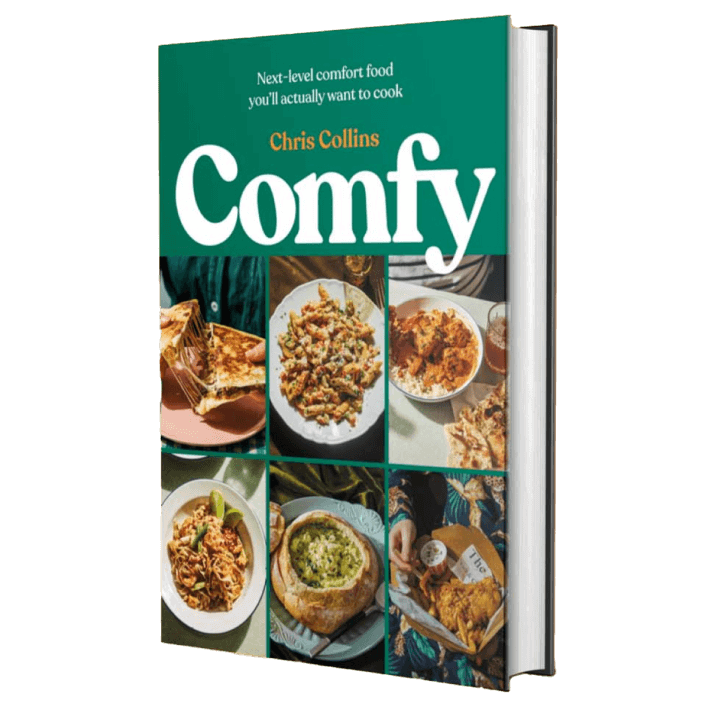
Looking for more?
You’ll find plenty more delicious comfort food like this in my Debut Cookbook ‘Comfy’
For more comfort food classics check out these beauties:
Hearty Ground/Minced Beef Dinners
- Spaghetti Bolognese
- Classic Lasagne
- Traditional Cottage Pie (or Shepherd’s Pie!)
- Chilli Con Carne
- Beef Enchiladas









This was delicious the first time I made it (using parmesan but otherwise following it exactly). This time I ended up with a lumpy became, which I fixed by straining before adding the cheese and egg. Perhaps because I mixed imperial measurements for milk, butter stick) but weighed the flour in grams. Just seemed like there was too much flour. Recipe still turned out great but I lost some of the delicious sauce by straining.
Typo…meant bechamel.
Could just be a case of adding the milk too quickly without having the flour properly incorporated. I find it’s more difficult to whisk smooth if the milk is cold too, so possibly that. Glad it still turned out okay though! C.
Reminds me of home just like my grandma makes !! I love this recipe thank you for capturing the true essence of Greek cuisine x
Thanks so much for the review, Bea! 🙂 C.
So looking forward to making this recipe for Moussaka. Have never made it before.
Hope it goes down well, Jean! C.
How many servings for small one?
Hi Michelle! This offers 8 modest portions which I typically serve with a side (something like a salad). C.
Absolutely delicious!!
Great to hear, Rosie! C.
About to try this recipe, how long do you salt the eggplant for?
Hi Lainie! You just leave it to sit for as long it rests before frying. Just dry off the excess water beforehand. C.
Holy hell this is amazing! Yes… it will take time. But it will take everything in you next to eat it all. Absolutely amazing. I’m thinking about when I can make it next.
So pleased it was a success, Charlotte! Thanks so much for the review 🙂 C.
I don’t know where to begin. Yes, the prep time is long. Took me 3ish hours prep and about 50 minutes in the oven. I started early today (Saturday) and it is now 5:20 pm and we are finally sitting down to eat. Absolutely outstanding! I am not Greek so I cannot speak to the authenticity of the ingredients or final outcome, but I can speak on how incredibly delicious this is. The process is extremely well written as are the listed ingredients. So amazingly delicious! What a recipe. Not for a quick weeknight dinner, but what a stunner for a Sunday dinner or a special occasion. Thank you for this recipe!
Thank you so much for the lovely review, Tamara! It can definitely be time-consuming, especially the first time around, but next time I’m confident you’ll prep it quicker 🙂 Thanks again. C.
I cooked this last night I had no courgette but went for it anyway. Having never made moussaka before I was feeling a little apprehensive but confident enough with your very clear instructions. I can’t thank you enough for sharing this recipe no tweaks needed at all but I will have some courgettes next time . Great job and your lasagne recipe is my next treat.
So pleased it went down well, Clive! Thanks so much for popping back for a review 🙂 C.
Unbelievably delicious. Thank you so much for this recipe. And to everyone making this make sure you prep your eggplant correctly it has to be covered in oil to soften or it will be tough which is a mistake I made but was able to fix.
Thanks so much for the review, Elizabeth! So pleased it went down well 🙂 C.